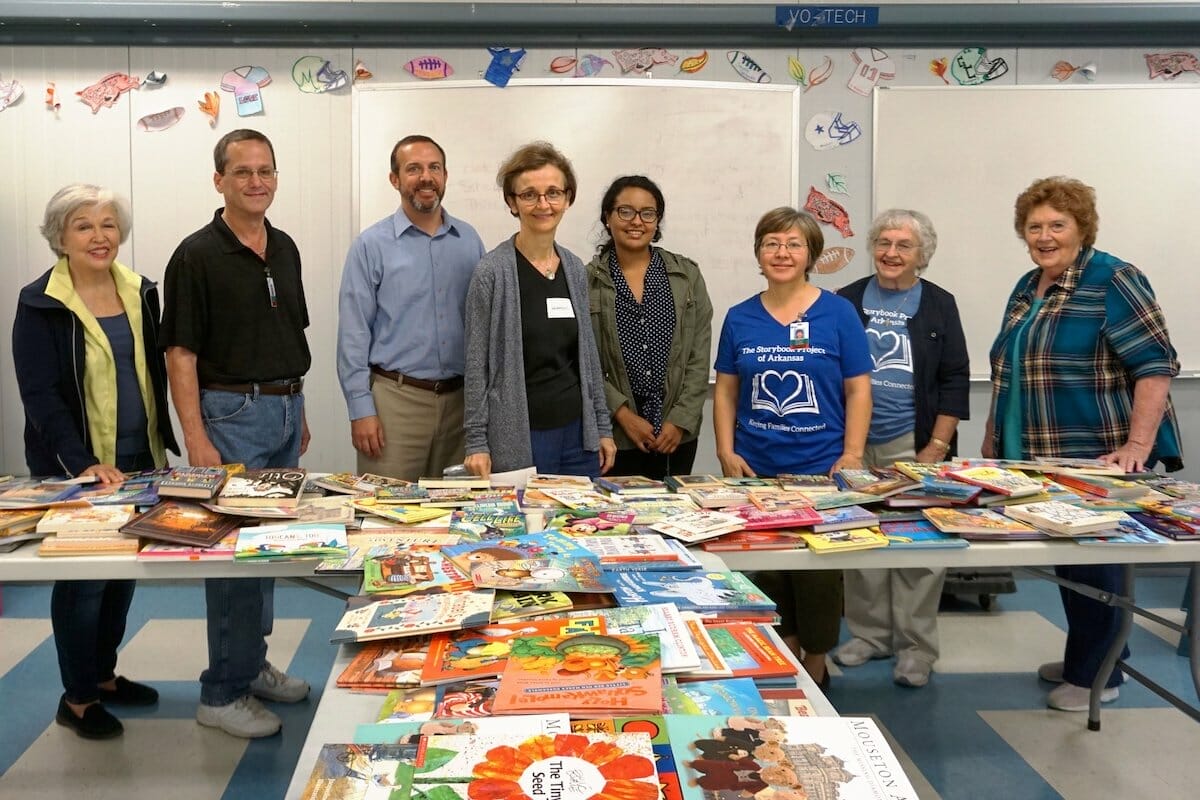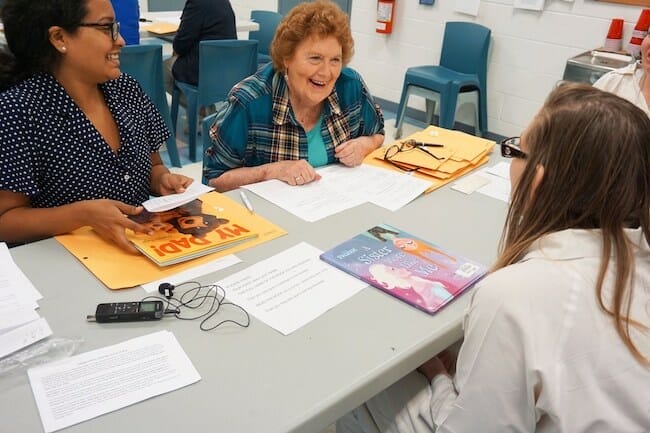

Uh oh...
It appears that you're using a severely outdated version of Safari on Windows. Many features won't work correctly, and functionality can't be guaranteed. Please try viewing this website in Edge, Mozilla, Chrome, or another modern browser. Sorry for any inconvenience this may have caused!
Read More about this safari issue.

Almost 30 years ago, a woman in Cherokee Village, Arkansas stood up in church and announced an idea to the congregation. Pat Oplinger had read about a prison program in Illinois, and she wanted to start something similar in her state. The idea took off.
For the next 20 years, that idea was the small organization taking volunteers into the prison units in Newport four times a year, giving moms and dads a way to connect with their children through reading. Funded by personal donations, rummage sales, and gifts from churches, the organization held its own until it was approved for 501c3 status.

It became The Storybook Project of Arkansas, now a recognized nonprofit organization with volunteers who go into the prisons and record parents reading books out loud: recordings and books then delivered to the home where their children are being cared for by someone else.
Denise Chai, president of The Storybook Project of Arkansas says Oplinger’s informal announcement became a simple, powerful way for moms and dads to connect with the children they do not get to raise.
“We give incarcerated parents the opportunity to be a good example to their kids and be present in the home. So many parents are afraid that they are missing out, so this lets them do something ‘normal’ for their kids.”
Children of Parents in Prison
Arkansas has one of the highest incarceration rates in United States. Children whose moms or dads are in prison carry the impact and trauma of having an incarcerated parent. According to the last statistics in 2016, that’s 16% of children in Arkansas. Chai talks about the alarming statistics both in the state and around the country, citing the research and importance of prioritizing the connection from parent to child.

High incarceration rates, recidivism and the growing prison population of women speak to why the connection is an essential part of the project. Along with recording books, parents can deliver messages to family members who might be with their children. Everyone in the home can hear the story recording and listen to the messages. Chai says this allows the parent to be “present” in the home in a way that becomes important when they are released.
“The parents are very interested in participating, especially the moms. Women are desperate for contact with their children and want to be good moms doing things for their kids. Before being incarcerated, women were usually the primary caregivers. Being separated from their kids is more traumatic for them, so they tend to get more emotional when they read.”
Volunteers Needed
Chai says the requirements for those who want to help have changed dramatically over the years. A name and driver’s license used to be the only things needed to go into a prison. It’s harder now. The Arkansas Department of Corrections requires a long vetting process with many steps. Between growing requirements and effects during the pandemic, they could use people who have the desire to help families and are willing to go through the process.

The Storybook Project of Arkansas has been invited to come to Tucker Max, Ouachita River Correctional Unit, and East Arkansas Regional. Volunteers receive training to assist parents who need help with reading. After a visit is arranged, the prison chaplain posts signs to let people know when the project’s volunteers are coming.
To participate, a person must have a certain disciplinary status and no “no contact” orders between them and the children or caretakers. Volunteers show up with milk crates full of books, so parents can select what they would like to read.
Simple Connection, Multiple Benefits
Chai is deeply invested. She maintains the website, organizes volunteers, and handles requests to come into additional prisons. She points out that while the large majority of participants are parents, volunteers also record stories with grandparents, uncles, aunts and close friends of the family.

She has seen the work grow and witnessed the testimonials. Children hear how much they are loved and missed by listening to the CD recording multiple times. Parents get to be a voice in the lives of their children in a way often taken for granted. Volunteers get the opportunity to make an impact and become the resource that delivers the voice, the connection and the story.
She tells about a 14-year-old girl named Anastasia who said she and her sisters enjoyed the book and recording they received from their dad, how one of those sisters was so young when he went to prison that she didn’t remember his voice, and how the project allowed her to hear what he sounded like.
That kind of experience is precisely the connection that The Storybook Project of Arkansas hopes to offer.
The Storybook Project of Arkansas
Mission: “Keep families connected during incarceration through the joy of reading.”
Watch the short video and read more about the organization.
To see how the project is helping families, read through the testimonials.
To find out how you can help, fill out the volunteer/get involved form.
All photos used with permission and courtesy of The Storybook Project of Arkansas
We do the work.
You check your email.
Sign up for our weekly e-news.
Get stories sent straight to your inbox!









Like this story? Read more from Rhonda Franz
At Sacred Hollow Flower Farm in Lowell, Arkansas, guests belong among the...
In Lowell, Arkansas, on business Highway 71, surrounded by mechanic...
The best way to find Mountain View, Arkansas might be to head to the...
Join the Conversation
Leave a Comment